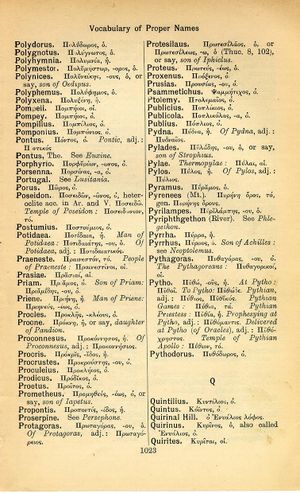Polyphemus: Difference between revisions
From LSJ
Θεὸς πέφυκεν, ὅστις οὐδὲν δρᾷ κακόν → Deus est, qui nihil admisit umquam in se mali → Es ist ein göttlich Wesen, wer nichts Schlechtes tut
m (Text replacement - "}}]]" to "}}]]") |
m (Text replacement - "link={{" to "link={{") |
||
| Line 1: | Line 1: | ||
{{WoodhouseENELnames | {{WoodhouseENELnames | ||
|Text=[[File:woodhouse_1023.jpg|thumb | |Text=[[File:woodhouse_1023.jpg|thumb | ||
|link= | |link={{filepath:woodhouse_1023.jpg}}]]Πολύφημος, ὁ. | ||
}} | }} | ||
{{Lewis | {{Lewis | ||
Revision as of 10:10, 15 August 2017
English > Greek (Woodhouse)
Πολύφημος, ὁ.
Latin > English (Lewis & Short)
Pŏlyphēmus: (-os), i, m., = Πολύφημος.
I The one-eyed Cyclops in Sicily, son of Neptune, who was blinded by Ulysses, Cic. Tusc. 5, 39, 115; Ov. M. 13, 772; 14, 167; Mart. 4, 49, 6; Juv. 14, 20; 9, 64; Hyg. Fab. 125; cf. Verg. A. 3, 618 sq.—
II One of the Argonauts, Hyg. Fab. 14.
Latin > French (Gaffiot 2016)
Pŏlўphēmus (-mŏs), ī, m. (Πολύφημος),
1 Polyphème [géant, fils de Neptune, un des Cyclopes] : Cic. Tusc. 5, 115 ; Ov. M. 13, 772
2 un des Argonautes : Hyg. Fab. 14.

